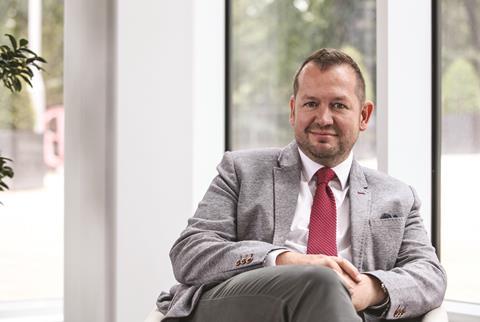North-west firm Hillyer McKeown has recently seen substantial growth in both its core legal services and its portfolio of non-legal diversified services, which include a marketing company and a management consultancy. Duncan Wood speaks to managing partner Steve Harvey
In 2016, north-west firm Hillyer McKeown (HM) saw turnover rise by over 30 per cent. This rise followed a period of intense activity, with staff numbers rising from 60 to over 80, the opening of an office in Liverpool (it already has bases in Chester, Wirral and North Wales), and the start of an ambitious eight-year business plan with a focus on expanding non-legal services for commercial clients.

The architect of HM’s strategy is managing partner Steve Harvey, who has been at the firm for 15 years. Back in 2002, HM was a single-office high street practice doing very little commercial work. ‘I started off with an empty desk and grew my commercial practice until we had enough work of a particular nature that I could expand the business and recruit solicitors to offer services like employment law and commercial litigation.’
Succession planning
Harvey became partner in 2006. Over the next few years, the number of equity partners declined naturally, to the point where only three senior partners remained by 2014, including Harvey. ‘It was abundantly clear to me that we needed up to five new partners, but there was a traditional mindset at the top that, in my opinion, hindered effective decision-making, including to allow a junior partnership team to come through,’ he says.
Fortunately, one of the senior partners conceded the necessity for change. ‘This allowed me to talk to the next tier down about the possibility of joining forces with me to drive the business and provide the partner with an exit that wasn’t perhaps visible from the outset,’ Harvey explains. ‘To do that, I wrote a formal business plan, something HM hadn’t really had before, so the junior team could stand squarely behind it and join forces with me in order to raise the appropriate capital to drive the initiatives necessary to make the business plan work.’
The business strategy
‘Back in 2014, the legal services market was hardening in terms of traditional bank funding, after the high-profile closures of firms like Halliwells, but there was more flexibility for businesses to manoeuvre themselves in a much more corporate fashion,’ Harvey remarks. ‘I realised the importance of having a decent market proposition and that we had to find our niche within the market so we could drive the business towards being best of breed. Unless your business is best of breed, it is less likely to be of interest to third parties and to be invested in.’
Harvey’s first task was to secure alternative business structure (ABS) status for HM. ‘Moving to an ABS structure meant that, as a firm, we were no longer tied to traditional working practices and could focus instead on expanding the business,’ he explains.
At the heart of HM’s business plan is the goal to provide top-quality professional services to enable clients to build successful and growing businesses. ‘We want our clients to see us as a trusted business adviser as well as their lawyer,’ says Harvey. ‘We want to be able to touch base with clients at least once a year.’ Central to this proposition is a suite of diversified business services calculated to appeal to HM’s commercial clients and strengthen the bonds between them and the firm.
‘There are a lot of statistics around the use of legal services by SMEs and owner-managed businesses which indicate that for a long time, law firms haven’t provided the services this market wants or needs,’ argues Harvey. ‘In our business plan, we are trying to turn around the disinclination of the market towards engaging with legal services providers because they don’t see the value of what is being offered. We want to provide those services in a cost-effective, added-value way.’
Expanding the offering
The blueprint for offering additional business services is based on the firm’s successful financial services joint venture, HM Financial Services, which delivers investment, inheritance tax and individual financial planning advice. HM has had a financial services department for many years, but an increasingly heavy compliance burden led to the firm entering into a joint venture in 2010 with a local independent financial advice practice called Greystone. Harvey soon recognised that the venture was contributing profitably to the overall pot, with little effort or time required on HM’s part. ‘This was the first step towards our business plan, because what was evident from the success of the venture was that it was, broadly speaking, based upon an established HM client base,’ Harvey says. ‘This begged the question: what more could we develop out of our client base? It gave rise to the possibility of developing other diversified services.’
Two other branded businesses have been launched in the wake of the business plan: HM Creative, a joint venture between HM and a PR and marketing consultant, Mason Media, offering PR, marketing and social media advice; and HM Business Growth, providing clients with a range of services including strategy, structure, employee engagement and leadership.
These HM-branded businesses do not provide legal services, so do not require ABS status nor Solicitors Regulation Authority regulation. They are also open to both existing HM clients and new clients, which presents HM with opportunities to engage with and offer services to a whole raft of non-client SMEs which may not perceive that they have any immediate legal requirements. ‘It also captures the attention of businesses which don’t care about or particularly value legal advice and compliance, but have an aspiration to grow or feel stifled in their desire to grow,’ Harvey remarks. ‘If we can turn an SME into a marketing or growth consultancy client and build a relationship with them, it is likely we will also pick up their legal instructions in the fullness of time.’
Data is arguably the most important element of the HM business plan, but also the most challenging, says Harvey. ‘Our lawyers need to understand the real value of client data and the importance of collecting it accurately. The more we know about and understand our clients, the greater insight we have into their challenges and aspirations, and the greater the likelihood of us helping them get there.’
The ability to slice and dice data is crucial. ‘Client data often starts with a simple skeleton of a commercial or private client. Over time, our challenge is to build out that skeleton to create a meaningful client profile based on the data gathered. Our War Room initiative, from a B2B perspective, is an ideal vehicle for this – it helps add the meat to the bones.’
The War Room, launched at the end of 2016, is an intensive three-hour session, chaired by the HM Business Growth team, which aims to help business owners look at the fundamentals of their businesses and tackle some of the major challenges they are facing. ‘This is a space in which we can become something other than just a law firm that these businesses wouldn’t normally approach,’ Harvey explains.
Following a War Room session, a follow-up report is produced for clients, providing opportunities for the wider HM business to deliver further consultancy services or, potentially, legal services to clients. HM Business Growth has already forged close ties with HM’s corporate and commercial teams. Similarly, HM Financial Services has connections with HM’s wills, trusts and estates department.
It’s in this cross-pollination of legal and non-legal services that Harvey feels the business offers real added value to clients. ‘All our teams, irrespective of their specialism, are encouraged to view their clients from a holistic perspective’, he explains. ‘That involves both solving specific issues and identifying opportunities outside their immediate discipline. Although legal services will always be at the core of what we do, the success of the business plan is reliant on our people creating additional business value for our clients, wherever they see the opportunity to do so.’
People and culture
Clearly, HM’s lawyers need to have some skills in upselling products and services. But while most staff have some business development objectives built into their personal development plans, Harvey believes that asking lawyers to be all things to all people – to be able to deliver significantly on business development, as well as fee-earn and manage their teams – is folly. ‘We have focused on a smaller group of people who have shown real business development ability, and have shaped their personal KPIs appropriately – this may mean reduced requirements to deliver on fees, but an increased expectation to deliver business opportunities.’
The success of any business plan relies upon employees understanding it and their role within it, says Harvey. ‘There is a huge requirement for professional services firms in general to ensure that their employees are engaged – human capital is something that needs to be developed as much as it can.
‘My view is that it cascades down from the top,’ he continues. ‘It’s really important that staff are communicated with and understand the successes – and lack of success – the business has had in the past, so there’s an appreciation of what looks good and what doesn’t. That can often change behaviour.’
Has the strategy changed the culture of the business? One of the elements of the strategy, both internal- and external-facing, is the development of a set of values that point outward to clients. ‘We use these values to score our staff in terms of their ability to deliver what we need them to,’ Harvey explains. ‘In terms of client service, we want to deliver an unrivalled experience. That cannot happen unless our solicitors are exceptional in living the values that we extoll to our clients.’
Going forward
Harvey’s ultimate aim is to create capital value in the ABS by the end of the eight-year strategy. ‘I’ve spent too long advising my clients about capital growth to not achieve some of that myself,’ he remarks. The strategy seems to be paying off so far – in 2016, revenues at HM grew by 27 per cent from its core legal services and 59 per cent from its diversified business services.
While HM has opened new offices across the north-west in recent years, Harvey doesn’t envisage the business extending any further south. ‘However, we do think there needs to be a service that is delivered online which goes beyond geographical boundaries. While the majority of the business is focused on the north-west, I think that in some aspects, we can be a national player.’ The strategy envisages primarily organic growth, although Harvey doesn’t altogether rule out mergers and acquisitions activity. ‘We will always be opportunistic – it’s in our nature as a business.’
Moving on
HM’s current strategy will come to an end in 2022. By that time, Harvey plans to have stepped away from his managing partner role. ‘I’d like to think someone will come through within the firm who will be able to take the business to the next level. I don’t want HM to die the slow death of many traditional firms, caused by senior partners staying on too long. There is a verve and enthusiasm needed for my role, so I would like my successor to fit the right age profile.’
As for himself, he suspects that returning to practice may be difficult. ‘But I will be happy to do whatever the new managing partner thinks I am capable of doing for them.’















